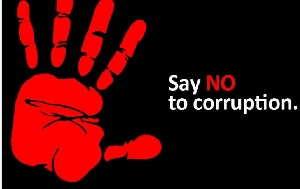The Ghana Anti-Corruption Coalition (GACC) has hinted that Ghana’s democracy stands at risk of being undermined by Serious and Organised Crimes (SOC), whose proceeds may be used to finance the activities of politicians.
Officials of the GACC interacting with the community members in Kasseh Ada identified illegal mining, money laundering, drug trafficking, smuggling, and prohibited cyber activity (internet fraud) as the major types of SOC in Ghana.
Mrs Beauty Emefa Narteh, the Executive Secretary of the coalition, told the Ghana News Agency in an interview that the coalition, in partnership with the Ghana Integrity Initiative (GII), the Africa Centre for Energy Policy, and with funding support from the Foreign, Commonwealth, and Development Office (FCDO), is organising a series of such sensitization programmes to educate Ghanaians on SOC-related issues and how they are becoming a threat to the elections of Ghana.
Mrs Narteh said that there are groups of people who plan, coordinate, and execute such SOC criminal activities as galamsey, internet fraud, and kidnapping, among others.
She disclosed that such activities were prohibited, but those involved in them have networks and links they use and may be sponsoring politicians to be protected when the need arises.
“We are selling the integrity of our election; we are creating space for people with questionable characters to put money into our elections, which is undermining our democracy,” she stated.
She added that the weaknesses of the implementation of the Political Party Act (Act 2000), which states that parties should disclose their sources of income, were not being implemented, making it difficult to know who their financiers are or whether they are Ghanaians or foreigners.
According to her, Ghanaians must demand that politicians disclose their sources of income to ensure transparency and accountability in the political system and also reduce the cost of politics, which has become a hindrance to people who naturally have the competence and the capacity to occupy such positions in Ghana from contesting and winning elections.
She urged the citizenry to, when possible, record acts of corruption and report them to the Office of the Special Prosecutor (OSP) to serve as evidence for prosecution.
Mr. Samuel Harrison Cudjoe, the Programmes Officer of the GACC, noted that the main problem in Ghana now has to do with the political financiers placing candidates to contest for elections, or in some cases, putting themselves up for election as a means of getting close to power and protecting their interests, which may not align with the national interest.
He stated that illegal mining, money laundering, prohibited cyber activity (popularly known as sakawa), drug peddling, and smuggling of goods, humans, and drugs are some of the ways criminals run their illegal operations in the country.
According to him, elections in the United States of America (USA) are not as competitive as in Ghana.
This, he said, was because the financiers see a loss at the polls as a huge loss of funds, and so, elections in Ghana have become a life-and-death affair.
“This has polarised, divided, and turned us against each other to the extent that even brothers don’t see eye to eye again because of politics,” he emphasised.
General News of Wednesday, 20 March 2024
Source: GNA

















